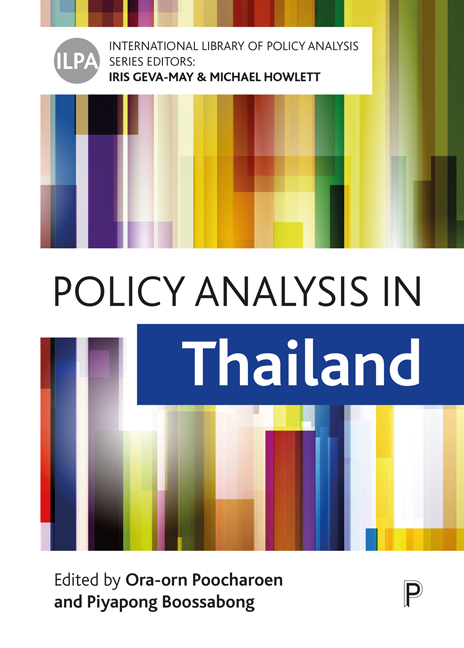Book contents
- Frontmatter
- Contents
- List of figures and tables
- List of abbreviations
- Notes on contributors
- Editors’ introduction to the series
- Introduction
- Part One History, styles and methods of policy analysis in Thailand
- Part Two Policy analysis within executive government
- Part Three Policy analysis beyond executive government
- Part Four Political parties and interest groups in policy analysis
- Part Five Policy analysis education and research
- Index
fifteen - Policy analysis instruction in Thailand
Published online by Cambridge University Press: 20 January 2024
- Frontmatter
- Contents
- List of figures and tables
- List of abbreviations
- Notes on contributors
- Editors’ introduction to the series
- Introduction
- Part One History, styles and methods of policy analysis in Thailand
- Part Two Policy analysis within executive government
- Part Three Policy analysis beyond executive government
- Part Four Political parties and interest groups in policy analysis
- Part Five Policy analysis education and research
- Index
Summary
Introduction
Public policy as a subject of study in Thailand has always been considered as a part of the field of public administration. Public policy has yet to flourish as a field on its own. Only a handful of public policy degree programmes exist in the country. On the other hand, there are over 100 programmes (bachelor's and master's combined) in public administration. The scope of public administration education in Thailand usually consists of main subjects such as organisational management, finance and budgeting, human resource management and also public policy. Thus, we can find the course title ‘public policy’ in virtually every university in Thailand. The National Institute of Development Administration (NIDA) in the 1970s first defined public policy as a subject under its master's degree curriculum in the Department of Administration. In the same department, a subject called ‘government project evaluation’ was included in the bachelor's degree. Then, in 1976, the Faculty of Political Science at Chulalongkorn University initiated its own public policy course. The subject's name was ‘process of policy and planning’. The emergence of public policy education occurred around this time to support the training of planning and policy analysts, a job title that first appeared in 1975. Thus, before 1977, the subject name ‘public policy’ did not exist. It was only in 1979 that the bachelor's degree of the Faculty of Political Science, Chulalongkorn University as well as the master's degree of NIDA opened the course called public policy initially as ‘public policy and project management’. Since then, public policy education has expanded to every university, both public and private, in Thailand where there are undergraduate, master's and doctoral degrees in public administration. All of them would have public policy as a required subject (Whangmahaporn, 2010).
For almost half a century, policy analysis instruction and research focused on policy study or the political science approach to understanding public policy, which gave importance to the use of models to study policy and policy implementation. This is because the topic of public policy was often taught under the faculties of political science, which would host departments of public administration, as already mentioned.
- Type
- Chapter
- Information
- Policy Analysis in Thailand , pp. 273 - 285Publisher: Bristol University PressPrint publication year: 2023



